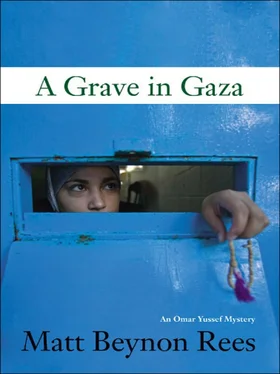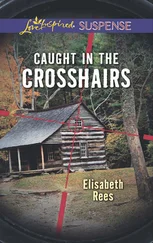Matt Rees - A grave in Gaza
Здесь есть возможность читать онлайн «Matt Rees - A grave in Gaza» весь текст электронной книги совершенно бесплатно (целиком полную версию без сокращений). В некоторых случаях можно слушать аудио, скачать через торрент в формате fb2 и присутствует краткое содержание. Жанр: Криминальный детектив, на английском языке. Описание произведения, (предисловие) а так же отзывы посетителей доступны на портале библиотеки ЛибКат.
- Название:A grave in Gaza
- Автор:
- Жанр:
- Год:неизвестен
- ISBN:нет данных
- Рейтинг книги:5 / 5. Голосов: 1
-
Избранное:Добавить в избранное
- Отзывы:
-
Ваша оценка:
- 100
- 1
- 2
- 3
- 4
- 5
A grave in Gaza: краткое содержание, описание и аннотация
Предлагаем к чтению аннотацию, описание, краткое содержание или предисловие (зависит от того, что написал сам автор книги «A grave in Gaza»). Если вы не нашли необходимую информацию о книге — напишите в комментариях, мы постараемся отыскать её.
A grave in Gaza — читать онлайн бесплатно полную книгу (весь текст) целиком
Ниже представлен текст книги, разбитый по страницам. Система сохранения места последней прочитанной страницы, позволяет с удобством читать онлайн бесплатно книгу «A grave in Gaza», без необходимости каждый раз заново искать на чём Вы остановились. Поставьте закладку, и сможете в любой момент перейти на страницу, на которой закончили чтение.
Интервал:
Закладка:
“Professor Adnan will be with you soon, sir,” she said. “May I bring you a drink?”
“Thank you. Soda water, please.”
The table was laid with two dinner settings of shimmeringly expensive silverware and crystal. Mentally, Omar Yussef set a place at the table for Eyad Masharawi and reminded himself that he must think carefully over every stage of his conversation tonight. Masharawi’s freedom depended upon it.
The maid brought him his soda water and disappeared. The glass shook in his hand.
The low strains of a Fairuz love song drifted through the room. Amid such opulence, Omar Yussef half expected the Lebanese diva to step from behind a curtain with a string quartet.
Instead, Professor Adnan Maki made his appearance. He came from a corridor whose entrance was disguised by a black cloisonne Chinese screen decorated with blue and red birds. He wore a loose cobalt-blue silk shirt that made him look like a movie pirate and dark linen pants. He reached his arms wide. “My dear ustaz Abu Ramiz,” he said.
Omar Yussef advanced carefully across the marble, in case it was as slippery as it looked.
Maki gave him three kisses on his cheeks. The smell of cologne was once again powerful. “Consider this your family and your home,” he said.
“Your family is with you.”
“Welcome, welcome, welcome, Abu Ramiz. Merciful Allah bless you.”
“Allah bless you.”
Maki held onto Omar Yussef’s hand and led him to the table. He pulled out a chair for him and slid it in under his guest. He glanced at the soda water. “Abu Ramiz, you are not in Hamastan any longer. The interior of this home is not even in Gaza, as far as I am concerned. It’s wherever I want it to be, and it can be a place for any enjoyments I care to arrange.”
I’ll bet, Omar Yussef thought. Maki certainly was right that his salon didn’t look like it was in Gaza. “As I mentioned earlier, I don’t drink alcohol, Abu Nabil.”
“Surely just one glass,” Maki said. “Your namesake, the ancient Persian poet, rhymed divine and wine. Was he not correct? Let’s toast to him.”
“Much as I enjoy the poetry of Omar Khayyam, my health doesn’t allow me to join you in your toast, Abu Nabil,” he said, gesturing vaguely toward the internal organs of his abdomen.
Maki raised a cautious eyebrow.
“But I don’t object to your partaking,” Omar Yussef obliged.
Maki snapped his fingers and the maid appeared, holding a silver tray with two fingers of whisky in a crystal tumbler. Maki took it without a glance and put it away. Even as he swallowed, he spun his finger to signal that he wanted another, and sat. He looked suddenly serious and leaned forward.
“Abu Ramiz, it’s such a pleasure to have cultured company.” He let out the groan of a man who has long suffered ignorant fools. “You can’t imagine how I’m stifled by Gaza and its provincialism. My wife can’t stand to be here longer than a few weeks. As you can see from the place settings, she’s not eating with us. No, she is eating in a far better establishment tonight. She’s in Paris.”
The maid poured another whisky and Maki dived into the glass as if he were coming down from the high board at the beach club in the dunes north of Gaza City. He came up, shivering as he swallowed, and peered across the table with the staring wide eyes of a man swimming underwater. “We have an apartment in Paris. A pied a terre, as they say. A little place built in the seventeenth century. It’s in the Marais. You know this part of Paris? It used to be the Jewish quarter, but now it’s rather exclusive.” Maki laughed. “I like that very much, to be an occupier of the Jewish quarter. Yes, this is my small revenge for the occupation of our land in Palestine.”
He emptied the second glass and, while his throat recovered, he wagged a finger to signal that he had a story to tell. “Some old Jews still live in our building in the Marais. I like to watch their little heart attacks when I tell them they share their staircase with a senior member of the PLO. They refuse to acknowledge me, so I just whisper Allahu akbar as I pass them on the stairs. My wife is there now, as a refugee from the dust and the heat of Gaza. The only negative thing about her absence, from her point of view, is that she will not meet you, dear brother Abu Ramiz.”
Omar Yussef felt he was supposed to smile. He twitched his cheeks and blinked. “Your children are in Paris, too?”
“Yes, a boy and a girl, may Allah be thanked. Both are doing graduate studies at the Sorbonne.”
“Did they do their undergraduate degrees here at al-Azhar?”
Maki laughed and reached forward to tap Omar Yussef’s hand, as though he were a delightfully naughty boy. “It’s a shame you don’t drink, Abu Ramiz. You’re so witty, even when you’re sober. You’d be hilarious if you would join me in a whisky. Of course they didn’t study here.”
The maid brought a bottle of red wine and poured for Maki. Omar Yussef covered the top of his wine glass with his palm, so that she wouldn’t give him any. The crystal sounded a light, full note as his hand brushed its rim.
“So you’re a schools inspector for the UN, Abu Ramiz?”
“I’m on a schools inspection at the moment. Usually I’m the principal of the UNRWA Girls’ School in Dehaisha camp.”
“Ah, the finest people are those of Dehaisha. Progressives, leftists. Not all Islamists, as they are in Gaza.”
“Although I’m the principal, my main activity is still teaching. For three decades I’ve been a history teacher.”
Maki threw his arms wide. “That’s my field also. Abu Ramiz, we are two historians. This is a wonderful night. Welcome, welcome, Abu Ramiz. We shall talk history all night and forget about the present troubles of Gaza.”
Omar Yussef smiled, politely. Moroccan soap operas or Egyptian soccer would have been more neutral distractions. But if Maki was relaxed, perhaps he would be more inclined to help Omar Yussef with the Masharawi case.
The maid brought a tray of mezzeh, distributing the small plates of salads and spreads in a spray across the table. Maki handed Omar Yussef a wide, flat bread with which to eat the salads and pushed each plate solicitously toward him. “Your health,” he said.
Omar Yussef scooped a deep red paste of ground nuts, cumin and chilis onto a corner of his bread and ate it. “This really is the best mouhammara I’ve tasted in a long time,” he said.
“These Sri Lankans know Arabic cooking better even than Arabs. However, I fear that your colleagues, the Swede and the Scot, don’t have the same feel for Arab culture. They can’t truly understand our situation here in Gaza,” Maki said. “And why not? Because they don’t understand the history. If one only knows recent politics, then everyone looks bad-the nationalists, the Islamists, the refugees, the resistance. One can’t see why Palestinians behave as they do unless first one traces the dim reaches of our history.”
“Do you think the men in the resistance know our history?”
“They may not have studied for a doctorate, but I believe they fight in the name of the Prophet Muhammad, who was a real historical figure, or Saladin, who personally fought for Gaza against the Crusaders.”
“What lesson should my foreign friends draw from that?”
“That our people were fighting invaders long before the Jews came. It has been a constant battle throughout our history.” Maki picked up an oily vine leaf, bit through to the rice wrapped inside and chased it with a hearty swig of claret. “Two thousand years before we began to reckon time from the foundation of Islam, the Pharaoh Thutmose was our first invader. The Canaanites took Gaza from the Egyptians, only for the Philistines to capture it from them. In the oldest part of our city, you can still see a ruined stone building popularly known as the very temple which Samson pulled down on the heads of the Philistines. It’s nonsense, naturally-what’s left of the building is no more than five hundred years old, but it has a place in our historic memory.”
Читать дальшеИнтервал:
Закладка:
Похожие книги на «A grave in Gaza»
Представляем Вашему вниманию похожие книги на «A grave in Gaza» списком для выбора. Мы отобрали схожую по названию и смыслу литературу в надежде предоставить читателям больше вариантов отыскать новые, интересные, ещё непрочитанные произведения.
Обсуждение, отзывы о книге «A grave in Gaza» и просто собственные мнения читателей. Оставьте ваши комментарии, напишите, что Вы думаете о произведении, его смысле или главных героях. Укажите что конкретно понравилось, а что нет, и почему Вы так считаете.












